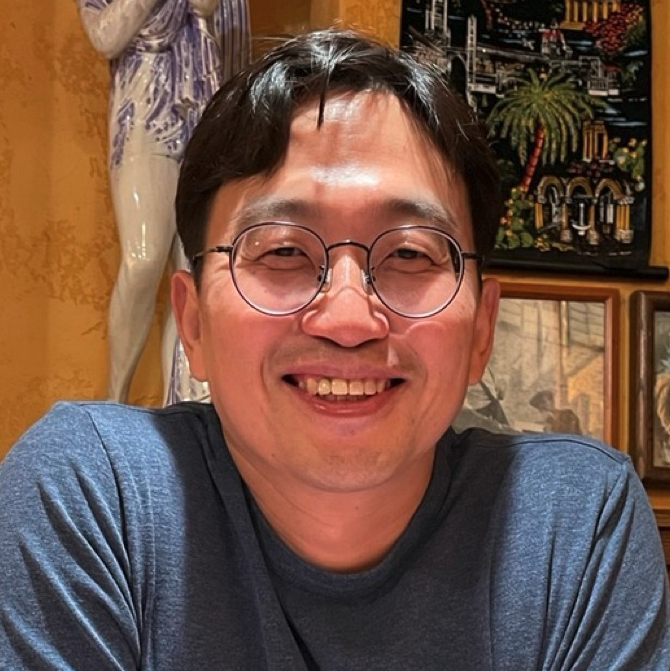[KAIST Medical Science and Engineering AI Special Lecture] Leading AI Innovation Across Industries - Silicon Valley Insights on Technology Transfer from Semiconductor & E-Commerce to AI-powered Biotech
Abstract
This special lecture explores how Silicon Valley’s unique innovation ecosystem enables transformative technology transfer across industries, drawing from my 20-year journey from mathematical optimization theory to AI-powered biotech innovation. Silicon Valley’s culture of principled risk-taking, combined with rigorous mathematical foundations, creates an environment where breakthrough innovations emerge through cross-industry pollination. The current AI agent revolution exemplifies this dynamic, as foundational AI capabilities developed in semiconductor and e-commerce applications are now reshaping biotechnology. Through examining the ecosystem effects that enable such transformations, we’ll understand how Silicon Valley’s approach to technology transfer differs fundamentally from traditional technology developments, creating sustainable competitive advantages through rapid iteration and bold vision execution.
My personal technology transfer journey illustrates these principles in action: from developing optimization and AI tools at Samsung Semiconductor that are still used by hundreds of Samsung semiconductor engineers today, to creating AI systems at Amazon that generated $200M in revenue impact, to scaling industrial AI across verticals as Co-Founder, CTO, and Global R&D Head of Gauss Labs, Inc., and finally to founding Erudio Bio, Inc. where we’re building AI-powered multiplexing biomarker platforms. Each transition required not just technical adaptation, but understanding how mathematical rigor translates across domains—from convex optimization theory learned under Stanford’s Stephen Boyd to today’s agentic AI systems that leverage domain-specific data architectures. This progression demonstrates how foundational mathematical principles, when combined with deep industry insight, enable entrepreneurs to identify and capture value in emerging technology frontiers.
The AI-biotech convergence represents the next major frontier for Silicon Valley innovation, driven by the same algorithmic foundations that powered AlphaFold’s revolutionary protein folding predictions. Current Silicon Valley biotech companies are discovering that competitive advantage lies not in accessing the best AI models—which are increasingly commoditized—but in building superior data architectures and domain-specific knowledge bases. Erudio Bio, Inc. exemplifies this approach through our vision of creating multiplexing biomarker data platforms for agentic AI, where privacy-preserving technologies such as homomorphic cryptography enable knowledge discovery while maintaining regulatory compliance. This convergence of AI agents, quality biological data, and cryptographic privacy represents a new paradigm where technology transfer success depends on understanding both the mathematical foundations of AI and the nuanced requirements of biomedical applications, creating opportunities for entrepreneurs who can bridge these domains effectively.
shorter version
This special lecture explores how Silicon Valley’s unique innovation ecosystem enables transformative technology transfer across industries, drawing from my 20-year journey from mathematical optimization theory to AI-powered biotech innovation. Silicon Valley’s culture of principled risk-taking, combined with rigorous mathematical foundations, creates an environment where breakthrough innovations emerge through cross-industry pollination. My personal technology transfer journey illustrates these principles in action: from developing optimization tools at Samsung Semiconductor that are still used by hundreds of engineers today, to creating AI systems at Amazon that generated $200M in revenue impact, to scaling industrial AI across verticals as CTO of Gauss Labs, and finally to founding Erudio Bio where we’re building AI-powered multiplexing biomarker platforms. Each transition required not just technical adaptation, but understanding how mathematical rigor translates across domains—from convex optimization theory learned under Stanford’s Stephen Boyd to today’s agentic AI systems that leverage domain-specific data architectures.
The AI-biotech convergence represents the next major frontier for Silicon Valley innovation, driven by the same algorithmic foundations that powered AlphaFold’s revolutionary protein folding predictions. Current Silicon Valley biotech companies are discovering that competitive advantage lies not in accessing the best AI models—which are increasingly commoditized—but in building superior data architectures and domain-specific knowledge bases. Erudio Bio exemplifies this approach through our vision of creating multiplexing biomarker data platforms for agentic AI, where privacy-preserving technologies enable knowledge discovery while maintaining regulatory compliance. This convergence of AI agents, quality biological data, and cryptographic privacy represents a new paradigm where technology transfer success depends on understanding both the mathematical foundations of AI and the nuanced requirements of biomedical applications, creating opportunities for entrepreneurs who can bridge these domains effectively.
